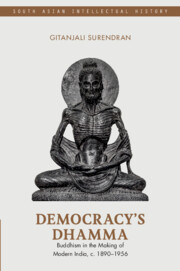Book contents
- Frontmatter
- Dedication
- Contents
- List of Figures
- Acknowledgements
- List of Abbreviations
- Introduction: Buddhism in the Making of Modern India
- 1 Anagarika Dharmapala in India
- 2 Dharmapala and Vivekananda in an Age of Universalism
- 3 Buddhism and The Bhadralok
- 4 The Buddhist Bay: Buddhist Mobility Across the Bay of Bengal
- 5 Buddhist Relics, The Mahabodhi Temple and The Discourse of a Shared Buddhism
- 6 Buddhism as a Civil Religion and Hindutva
- 7 Buddhism, Anti-Caste Radicalism and Socialism
- 8 Ambedkar, Dhamma and Democracy
- Conclusion: The Destinies of Buddhism
- Bibliography
- Index
4 - The Buddhist Bay: Buddhist Mobility Across the Bay of Bengal
Published online by Cambridge University Press: 28 November 2024
- Frontmatter
- Dedication
- Contents
- List of Figures
- Acknowledgements
- List of Abbreviations
- Introduction: Buddhism in the Making of Modern India
- 1 Anagarika Dharmapala in India
- 2 Dharmapala and Vivekananda in an Age of Universalism
- 3 Buddhism and The Bhadralok
- 4 The Buddhist Bay: Buddhist Mobility Across the Bay of Bengal
- 5 Buddhist Relics, The Mahabodhi Temple and The Discourse of a Shared Buddhism
- 6 Buddhism as a Civil Religion and Hindutva
- 7 Buddhism, Anti-Caste Radicalism and Socialism
- 8 Ambedkar, Dhamma and Democracy
- Conclusion: The Destinies of Buddhism
- Bibliography
- Index
Summary
A HIDDEN HISTORY OF BUDDHISM
There is a particular type of literature that sees empire as a nobler version of an Indiana Jones adventure. This literature suggests that British colonials were responsible for the ‘discovery’ and ‘return’ of India's Buddhist heritage. Charles Allen, for example, criticized Edward Said and scholars influenced by his important theoretical intervention Orientalism for failing to ask ‘where we would be without the Orientalists’. The orientalists, a particular breed of East India Company official-cum-adventurer-cum-scholars, ‘initiated the recovery of South Asia's lost past’ and ‘the European discovery of Buddhism and the subsequent resurgence of Buddhism in South Asia arose directly out of their activities’. British efforts to find, unearth, translate, collect and legislate around Buddhist material culture and India's built and literary heritage make for a fascinating story. However, to draw a direct line between British archaeology of Buddhist sites and the resurgence of Buddhism in modern South Asia as yet another instance of the great gifts of colonialism to India is to intentionally ignore the very considerable interventions, efforts, creativity and intellectual engagement of a range of Buddhists from not just the Indian subcontinent but further afield, from among Buddhist communities in Southeast and East Asia. It is one thing to dig up a site and write about it in an elite journal. It is quite another to undertake long and difficult pilgrimages in the 19th and early 20th centuries in order to bring these sites alive, as places of Buddhist worship and practice. This latter work was done by largely South, East and Southeast Asian Buddhists. If there is a story of the return of the Buddha, it is these actors who played the main role. And it is these actors whose efforts constitute what is clearly still a hidden history of modern Buddhism in India.
Not that the colonial context was unimportant, as mentioned earlier. The 19th-century transport revolution played a critical role in facilitating the movement of people at scale. Expanding shipping lines, the ever-growing railways, improved communications and dissemination of information about pilgrimage sites via print all contributed to an enormous expansion of pilgrimage, especially international pilgrimage, from the 1890s onwards. Mobility was at the heart of modern Asia's colonial history.
- Type
- Chapter
- Information
- Democracy's DhammaBuddhism in the Making of Modern India, c. 1890–1956, pp. 125 - 162Publisher: Cambridge University PressPrint publication year: 2025

